- Home
- Matt Hilton
Tempus: The Phoenix Man Page 23
Tempus: The Phoenix Man Read online
Page 23
Governor Semple also seemed fine with their rebellion. ‘Consider yourself removed from this steering committee, Doctor Heller; you too, Professor Doherty. From here on in you will neither be consulted on nor have any voting power on any future decisions taken in regards the use of the Tempus chamber. I will, however, require you to remain on hand to help with the operation of the device. I can’t place all the scut work on young George, can I?’
On hearing his name, Fox lifted his head. ‘Sir, you do realise that for the people we send over, this is a suicide mission? They can’t be brought back or we could cause a similar breach to form again.’
‘Then we must not tell whoever is chosen for this task,’ Semple said.
‘More betrayal?’ Heller gasped.
Semple lifted a warning finger. ‘You no longer have a say in this, Doctor Heller.’ His tone brooked no argument or dissent. ‘It pains me that they’ll be stuck in that nuclear wasteland until death claims them. But then-’ he indicated the monitors ‘-it’s a fate we can all look forward to if we don’t do this.’
‘I’ll go find a couple of volunteers,’ Major Coombs offered.
Semple lifted a palm, stalling him. ‘I already have some people in mind.’
Coombs was happy to sit back down.
Chapter 30
July 4th 1989
Ground Zero, London – Old City
More than anything Sergeant David Johnston found the sky most perturbing. He was standing at the edge of a massive crater, at the center of which the very ground had been melted by such high temperatures that the earth had turned to glass. Huge mounds of rubble were piled at the crater’s edge, and had been strewn in an ever-widening circle across the ruins of the city from the point of nuclear strike at Whitehall. In the distance, through gaps in the dust clouds that billowed across the landscape like wraiths, he could detect the occasional structure that had survived the blast, but only as ragged stumps, and skeletal, twisted steel girders. Wind moaned over what was once the City of London, carrying with it the irradiated dust formed from brick and stone, wood and steel, and the immolated corpses of millions of people. The landscape was hellish, but it was nothing compared to the sky.
When countless nuclear and atomic bombs rained from above, billions of tons of dirt had been sucked skyward by the resulting mushroom clouds, some of the dirt cast so far into the heavens that it was yet to fall back to earth more than a year later. The accumulation of dirt, ash and smoke shrouded the planet, blocking the sunlight, and causing a perpetual twilight. The overhead clouds were green and yellow, purple and shades of brown and deepest black. Lightning built and flashed to earth, accompanied by thunderous cracks and rumbles. The sky was bruised, like the cancerous lungs of a heavy smoker, and didn’t look as if it would ever recover from its terminal illness.
The mean temperature had plummeted, and as Johnston moved, he was careful not to slip on the hoar frost that made the ground more treacherous than it already was. It wasn’t an easy task in the bulky NBC suit and oxygen tanks he was clad in. He was also burdened with scientific equipment he had little understanding of. He wasn’t a scientist, he was a simple grunt, a squaddie, but his comprehension of the instruments didn’t have to extend beyond how to switch them on and off. On his return to his own time and place Professor Doherty, George Fox or one of the other dozens of lab techs and specialists would download and examine the data the gizmos collected. The only reading he was constantly conscious of was the bars of colour growing and receding on the LED screen of a device strapped to his left arm like an overly large wristwatch. Green meant safe; amber that he was in danger from the levels of radiation; red meant that he was fucked. Thankfully there’d only been an infrequent blip into the amber spectrum, even this close to ground zero.
Rain hissed from the sky.
It was the colour of piss.
It pooled in crevices and pockmarks in the ground, and where it adhered to anything organic it ate it away with malicious tenacity. More dangerous to him than the radiation was the acid rain – should it breach his Nuclear/Biological/Chemical suit it would sear the skin and muscle from his bones. Out of habit, he took his gaze from the Geiger counter on his wrist and checked the seals at the cuffs of his enforced rubber suit, and at his ankles, where he was most likely to be breached.
As quickly as it began the rain subsided. Johnston moved back from the rim of the crater and looked to where the Big Ben clock tower once stood as a world famous landmark. The clock was gone, as well as the tower that held it. The Thames had been boiled dry and was now a snaking river of petrified mud that snaked away through the undulating mounds of destruction. In the distance, towards the Isle of Dogs, lightning struck the ground, a ribbon of lambent flame that scorched the ground all the more.
On the same wrist as the Geiger counter, he also wore a conventional watch – conventional in the sense that it told the time. He’d been in this hellscape for more than two hours, and had little more than forty-five minutes yet to endure before transvection would take him home again. It felt like he’d been in this modern God-scorched Sodom for days not hours, but understood it was because his nerves and senses were on high alert, and a result of his super adrenalized state of mind. In his right hand he held aloft a thermal imaging camera, scanning his surroundings. On a small 7.5 CM2 screen the landscape was depicted in varying shades of green. Anything warmer than the ambient temperature would fluoresce white, but as yet he’d seen nothing brighter than the pale green puddles of acid rain.
There was no sign of life.
The sky was empty of birds, the ground devoid of vermin, the mounds of rubble vacant of any insect life that he’d been able to determine. Sign of human survivors he’d given up hope of finding. If anyone had survived the nuclear strikes they’d be far from this place and most likely deep underground.
So what was the source of the sounds he could hear?
It was a rhythmic clack! Not unlike the noise made by a flagpole in high wind.
He guessed it could be some loose item of debris making the noise, tugged by the breeze and then falling back against a hard surface. But the wind moaned and keened at odds with the regular clacking.
He scanned his immediate surroundings via the thermal imager and when it shed no light on the source of the racket, he elected to take a second look around. The visor on his NBC suit was slick with acid rain, his vision temporarily obscured. He used the back of his right arm to wipe the visor, but that only smeared the streaks of water. He cursed, cocking his head to better hear the sounds.
They emanated from behind a high wall of bricks and girders, all which remained of a once proud building. He began a slow walk towards the mound of rubble, slip-sliding on ice on the shattered paving. Gusts of wind pulled at his heavy suit like the beseeching hands of starving children. The rain came on again, this time heavier. Froth built on the paving as the ice dissolved. He imagined the stench would be horrible, but could get no sense of it through his respirator, only a faint silicone tang that nipped at his tongue.
He had not come unarmed. He had a sidearm in a snap holster on his thigh, but the rest of the equipment he was forced to tote encumbered him. At any rate, he didn’t feel physically threatened: he was the only living thing within many miles, he reasoned.
But then, he would never be accused of being the most erudite when it came to sound judgement: he’d volunteered for this insane mission, hadn’t he?
He rounded the mound of rubble and found himself staring directly at another man dressed in identical kit to him. The difference was, where his suit was baggy and hung about his frame in folds, the suit on this huge man was taut. The man wasn’t loaded down with scientific equipment, but he was undoubtedly another jumper from Johnston’s own time.
His first thought was why the man was there.
His next: Who is he?
The features of the man facing him were indistinct through his visor. The big man was carrying an assault rifle, and he knocked the stock once m
ore against a cube of concrete poking out of the ground. Clack! On seeing Sergeant Johnston, he halted the motion, and straightened up. He was easily a head taller than Johnston. Johnston thought he recognised the set of the big man’s shoulders, his thick waistline, and the sturdy legs. He’d seen a similar man regularly back at the Tempus facility, an orderly who was practically a manservant to Governor Semple.
Where that man went, his equally large friend forever shadowed him. Instinctively Johnston turned to look for the twin. As he did so, his foot slipped on slick hoarfrost, and he twisted to save his balance, arms lifted and spread like a tightrope walker.
The reaction was all that saved his life.
Coming at him from where he’d lain hidden among the piles of rubble was the second orderly. The big man wasn’t comfortable with a gun in his hand, but he was swinging a truncheon with practiced ferocity. Instead of the side of Johnston’s head, the tip of the truncheon found his rising shoulder. The tough rubber suit protected him somewhat, but it still felt as if a mule had kicked him. Johnston cried out, a shout of pain and confusion. He staggered away from his attacker, barely avoiding a second swing of the truncheon. The first man came at him now, thankfully with the assault rifle braced across his middle rather than barrel first: he too was unfamiliar with weaponry and preferred to bludgeon rather than shoot.
Stunned by the sudden attack, Johnston cried out at the men. His only reasoning told him that they’d confused him for an enemy, and he tried to rectify their mistake. By the time he concluded that they neither listened nor cared, and dropped the thermal imaging camera and reached for the handgun holstered on his thigh it was a shade too late.
The truncheon wielder renewed his attack. This time he came at Johnston with an overhand swing and the truncheon struck the sergeant on his right shoulder. Johnston went to one knee, his shoulder numbed by the blow, his right arm useless. His arm might be broken for all he knew. He attempted to reach across with his left hand but it was awkward and he couldn’t free the gun from the holster. He was struck again, this time across his back, and he arched backwards with a grunt of pain. The big man with the rifle butted him over with the stock to the gut. Johnston rolled into a shallow ditch formed by the upheaval of broken paving stones. He wallowed in a puddle of acidic slop.
He cried out again, trying to warn the orderlies he wasn’t their enemy. Stupidly he realised his sentiment was wholly incorrect as the gunstock slammed down against his chest, pinning him in place. He looked up, blinking wildly at the towering figures over him and understood the folly of volunteering at Governor Semple’s bequest; he should have known that it made him expendable. Pity his would be killers had come to the same conclusion.
The truncheon came down on Johnston’s head. The NBC suit afforded him some protection, but not enough. Pain flared through him and darkness edged his vision. Survival instincts kicked through him and he bucked and squirmed, tried to force a way from under the rifle stock that pinned him down bug-like on an entomologist’s slide. Another blow was struck at his head, and this time chunks of plastic rained over his face as his visor was ruptured. Acid water splashed his chin, and immediately came the burning pain. Johnston screamed: he finally found the desperate strength to push away the rifle and rolled sideways from the next blow. It came down on the back of his skull and he felt the snap of bone, the tearing of his flesh. He bit down, drawing blood from his tongue. Another strike of the truncheon ended on the back of his head, and Johnston pitched forward, landing belly down. He tried to crawl away, and made it half way out of the ditch before the stock of the rifle came down a third time on the back of his head.
Johnston tried to rise again, but managed only to roll onto his back before all strength fled him. He lay still.
His eyes were open.
He wished for oblivion.
It wouldn’t come.
Then he felt it: the eating away of the flesh on his back. His NBC suit had been breached, and the puddle water had invaded his protective clothing. Now it sloshed between the skin of his back and the rubber encasing it.
Johnston wanted to scream but no sound came forth.
He lay as if dead.
One of the giants prodded him.
Satisfied that their job was done the two turned away.
They waited for the transvection home that never came. They walked away muttering between them.
They forgot about David James Johnston as he forgot about them.
As he forgot about himself.
He wouldn’t see them again until years later when he’d be dragged like a feral thing from under a gloomy painting in the ruins of the National Gallery, where the two dimwitted men had found their place once more by the side of Terrence Semple, though this time as the Guvnor of The Castle, in Old City, their original master’s doppelgänger.
James Rembrandt didn’t recognise the men who had come so close to murdering him, but they often caught him wondering about the murderous looks they cast him.
Chapter 31
January 28th 1988
Wapping, London
Parked at the junction of Wapping Wall and Monza Street, the faded red Transit van didn’t look out of place. Other vans and lorries took up every available parking space outside the various service doors and bays of the old Metropolitan Wharf building. In later decades – in a world untouched by nuclear war – the buildings would be gentrified, redesigned as flats and executive apartments for trendier clientele. But now they were industrial spaces, and the workplaces of rough and ready men and women. Rembrandt ignored the activity at the front of the old wharf building, instead training his gaze along Monza Street to where it dead-ended a couple hundred yards away at some sort of embankment wall. He watched a dog walker stroll by and realised there was a walkway at the far end, allowing civilians passage alongside the tenement buildings back towards the Thames, or in the other direction towards the Benson Quay area.
If Mina Feeney’s word was to be trusted – and to be fair, her life was her wager on her honesty – Barry Miller’s wife and daughter were being held in a semi-derelict tenement block at the far right end of the street. An old Bedford truck with a box unit on the back was parked very close to the building of interest. Rather than pose as cops as they had to snatch Barry, a second group of kidnappers had turned up outside their family home in a house removals truck and carried the unconscious duo to the truck inside sealed packing crates. They’d brought mother and daughter here, and inside the old tenement building, which was apparently slated for demolition very soon. All other inhabitants, including illegal squatters had been cleared out prior to the operation. It should be safe to go in and release the hostages. Should be. Unless Mina Feeney was supposed to give a pre-arranged code word or such when ringing in: at gunpoint she’d related to her confederates how everything with Barry Miller had gone as smoothly as planned. Rembrandt hadn’t been happy with allowing the call, but she had been adamant about Marjorie and Jessie’s fate should she fail to do so. Also she’d been as equally adamant that she preferred to hold on to her life than see a successful end to the assassination plot. She had promised not to say a wrong word, and by all intents and purposes she had been true to her pledge. The man she’d talked with briefly caught no hint that she was insincere, but Rembrandt knew that he could be wrong. Perhaps an ambush was being readied for them. He wouldn’t allow such concerns to deter him.
Mina was under guard, watched over by Crystal. Who better to guard her than someone who could not be beguiled by the woman’s bewitching beauty? Benny Oxford was also standing guard, but his task was to ensure Brent Walker’s body went undetected. They were all at a secondary forward operating base the team had set up prior to their surveillance of Barry Miller.
In the van with Rembrandt were Harry Bowlam and Jamal Dhand, and in the back, because it was the only way that he could be controlled, was Barry Miller. Miller would take no part in the raid to free his family, but Rembrandt wanted him nearby so he could be a calming influence
on the females once they were out from under the clutches of their abductors.
Jamal got out of the van and moved away. He walked along Monza Street, nonchalant, hands in his jacket pockets, looking like any other resident of the area. His boots barely made a sound on the cobble surface. He moved past the removals truck and took a right onto the path where the dog walker had disappeared minutes ago. Harry then got out. He looked back at Rembrandt, his eyes still tinged red, but the chief knew he could be relied on to keep a calm head. Bowlam was seething for vengeance, but the living members of the team came first. They shared a nod of mutual respect, before Harry slipped away, heading down Wapping Wall in the direction of the river. Both men would conduct recces of the tenements before moving in to cover the rear of the target building in exactly ten minutes.
Rembrandt sat in the driver’s position, hands at ten to two o’clock on the steering wheel. He gripped and ungripped the wheel as he watched the time tick down on his wristwatch.
Someone walked over his grave.
The expression was an odd one, but it was the generally accepted term for when experiencing a queer shudder through the body, the hair on your neck stands on end and an uncanny sense of foreboding assails you. He shook himself upright, realising that he’d slumped in the seat. He blinked wildly for a few seconds before glancing at his watch. He hissed a curse, sitting up taller in the seat. He’d lost the best part of five minutes.
What the hell: had he fallen asleep?
‘Hey! Chief? Are you OK?’
Rembrandt heard Miller’s query from behind, but the man’s voice sounded distant, as if it came to him from a long distance through a clinging fog.
Unconsciously, Rembrandt reached back and touched the scars on the back of his skull. His old wounds tingled, and he felt a momentary tightening of the scar tissue that marred his back from neck to hips.

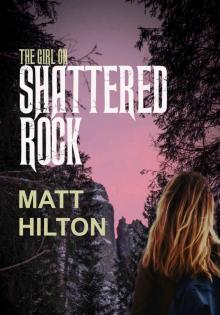 The Girl on Shattered Rock: A gripping suspense thriller
The Girl on Shattered Rock: A gripping suspense thriller Collision Course
Collision Course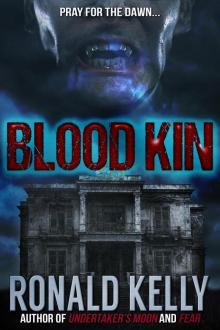 Blood Kin
Blood Kin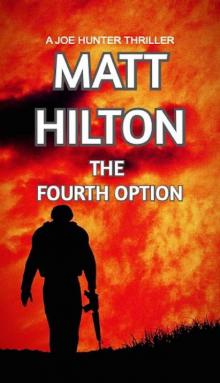 The Fourth Option
The Fourth Option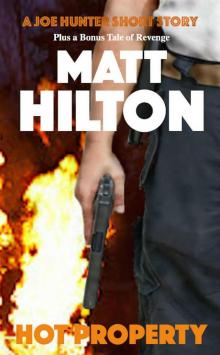 Hot Property: A Joe Hunter Short Story
Hot Property: A Joe Hunter Short Story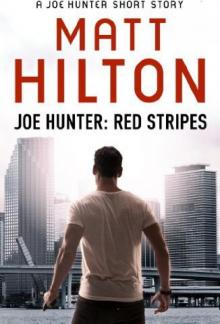 Red Stripes
Red Stripes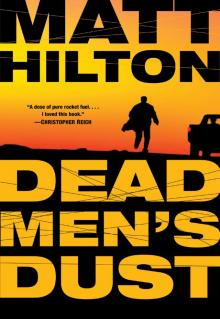 Dead Men's Dust
Dead Men's Dust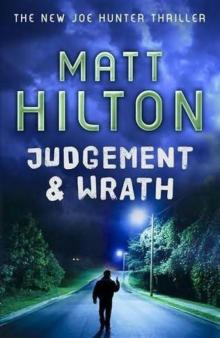 Judgement and Wrath
Judgement and Wrath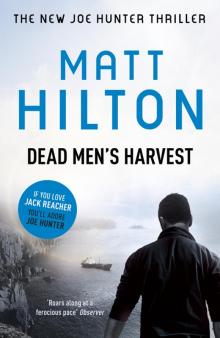 Dead Men's Harvest
Dead Men's Harvest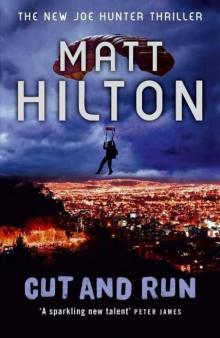 Cut and run jh-4
Cut and run jh-4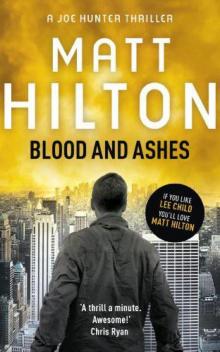 Blood and Ashes jh-5
Blood and Ashes jh-5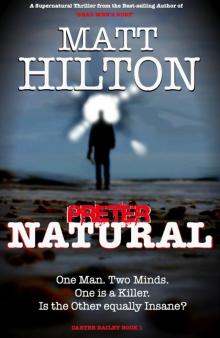 Preternatural: Carter Bailey Book 1
Preternatural: Carter Bailey Book 1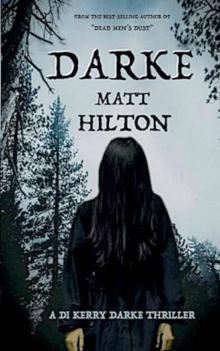 Darke
Darke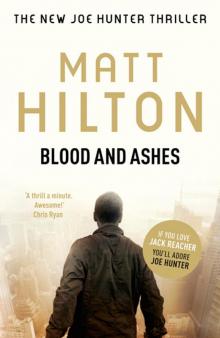 Blood and Ashes
Blood and Ashes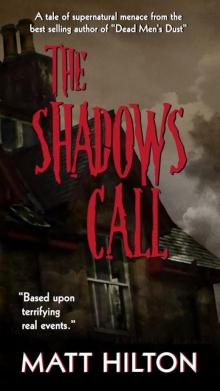 The Shadows Call
The Shadows Call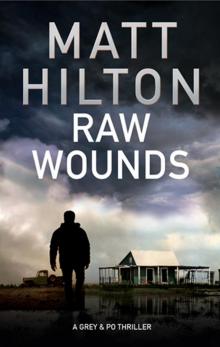 Raw Wounds
Raw Wounds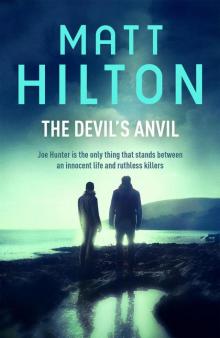 The Devil's Anvil
The Devil's Anvil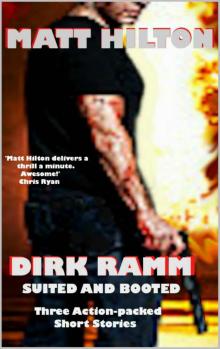 Dirk Ramm: Suited and Booted
Dirk Ramm: Suited and Booted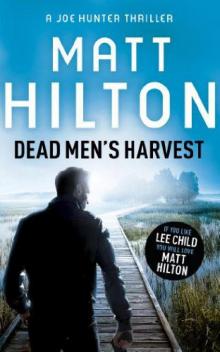 Dead Men's Harvest jh-6
Dead Men's Harvest jh-6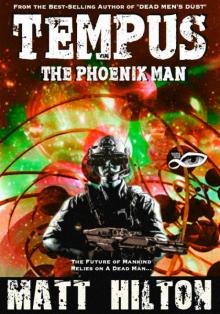 Tempus: The Phoenix Man
Tempus: The Phoenix Man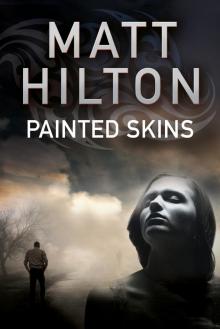 Painted Skins
Painted Skins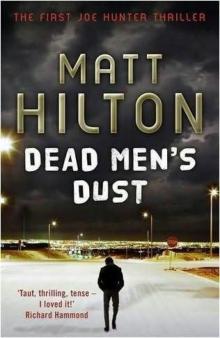 Dead Men's Dust jh-1
Dead Men's Dust jh-1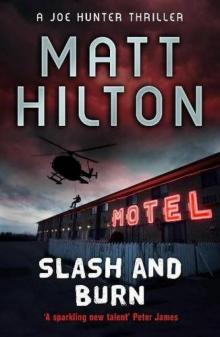 Slash and burn jh-3
Slash and burn jh-3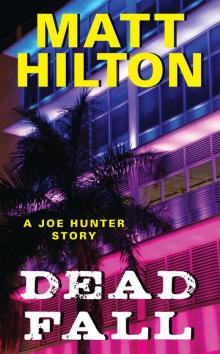 Dead Fall
Dead Fall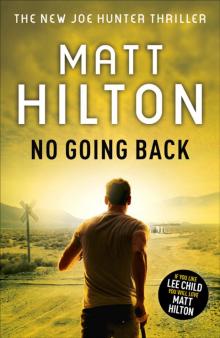 No Going Back - 07
No Going Back - 07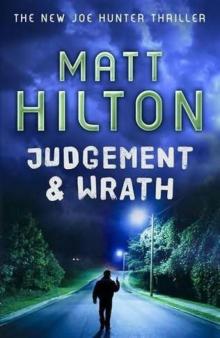 Judgement and Wrath jh-2
Judgement and Wrath jh-2